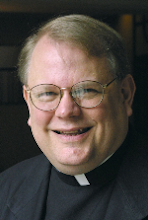
Thirty-Second Sunday in Ordinary Time
Homily
Seven brothers and their mother were arrested, less than two hundred years before the birth of Jesus and were tortured and killed by Antiochus Epiphanes for their faithfulness to the Law of God.
Today we hear of the death of three of those brothers, and each of them teach us something about the mind of the martyr.
Martyrs are always intriguing figures. As a child I can remember marveling at the courage of those who looked literally into the mouth of the beast and still did the right thing. As an adult, my resolve to do the will of God is strengthened by their example and that hope that a human being can act so courageously. I’m simply amazed at the martyr and really want to know what makes him tick.
Well the brothers Maccabee give us three hints today.
The first brother is particularly courageous. He gets right up in the face of his torturer and demands to know why he is doing this, and then at the point of death asks him, What do you think you’re doing?
The first brother represents the naievate of the pure soul, the absolute befuddlement of the innocent that any human being could be as cruel as his tormentor. We see it in the Martyr-deacon Lawrence, who helpfully reminds the ones burning him to death, to turn him over, since he was done on one side. We see it in the beatific smile of the Martyr-Deacon Stephen, who gazes not, as I would, at the stones tumbling in the direction of his head, but on the face of Jesus gazing down from heaven. The heart of the Martyr, it seems, is so set on the glory of the next world, that he can barely recognize the torment and sin that surround him in this one. Such vision gives to the martyr the power to defeat even the mightiest of this world’s powers. So the first virtue of the martyr, then, is purity of vision.
The second brother teaches us something even more difficult to understand, for he willingly gives them his hands to be cut off and his tongue to be ripped out, seemingly oblivious to his sufferings. “It is from heaven that I received these,” he tells his tormenters, “and from heaven that I hope to receive them again.” He is filled with an unassailable faith which refuses to waver, even in the face of pain and death. He is fearless. The second brother teaches us that martyrs willingly, and indeed joyfully, give everything to God.
And then these is the third brother. This one has endured a particularly cruel fate, even worse than the first two, for he has been made to witness his own brothers’ death. But despite enduring the agony of witnessing their demise, he is even more determined than they are. “It is my choice,” he boldly proclaims, “to die at the hands of men with the hope God gives of being raised up.” He goes to his death with the absolute conviction that this is not the end and that he and his brothers will be raised up to live with God at the end of time. He teaches us the Martyr’s virtue of unwavering faith in the promises of God.
Now while there is no government officials in Worcester ready to torture us to death for our faith, we have plenty of opportunities to exercise the virtues of these martyrs.
Like the first, we are tempted every day to let ourselves be distracted from that which leads us to God, to distort our vision and see the world not as a sanctuary in which can perform the works of God, but a stage made for our glorification and the satisfaction of each of our wants. Yet if we are to follow the example of the first young Maccabee, we will make our vision clear and set our hearts solely on Jesus and God’s will for our lives.
Like the second brother, we will stop counting the cost of loving our enemies, strategizing how to get by with just enough sacrifice to get us to heaven, and rationalizing the many ways in which we avoid giving God everything he first gave to us. If we follow the example of the second young Maccabee, we will joyfully place our hands, our tongues and our hearts at the service of God’s will, oblivious to the suffering it might bring our way.
And finally, like the third brother, we would have faith, that in the end God will make sense of it, will right every wrong, make straighten all that is crooked, and lead the just home to eternal glory in his presence forever. We would have unwavering faith.
So while the Maccabees and the other Martyrs may seem far off, their struggles are as close as our next temptation, fear, or reluctance to believe the incredible good news that Christ has chosen us to be his brothers and sisters and on the last day he will raise us up from the dead.
Monsignor James P. Moroney
Rector

